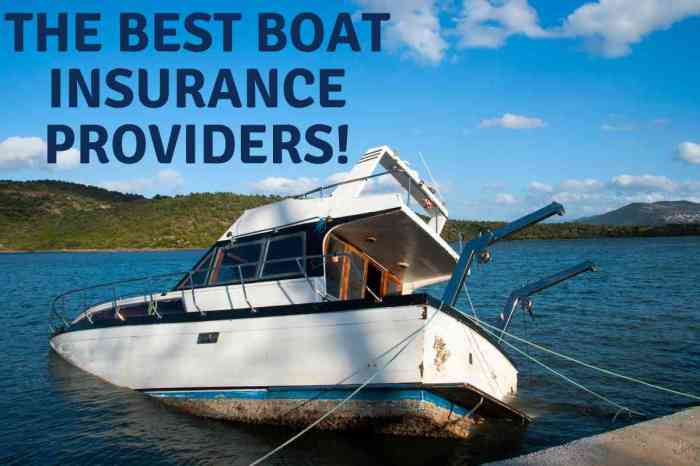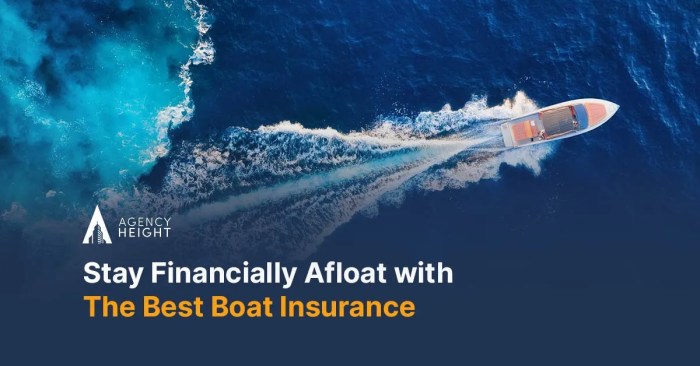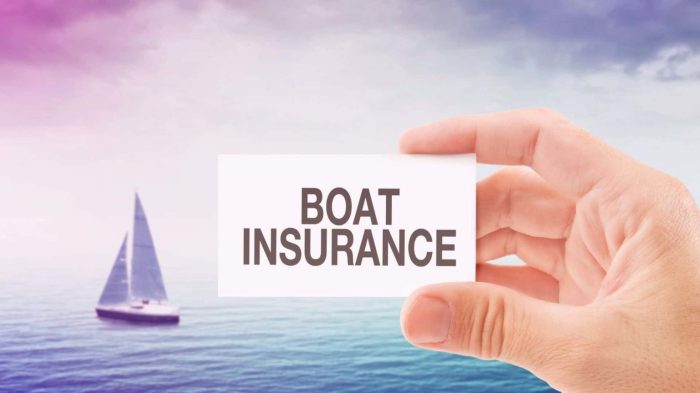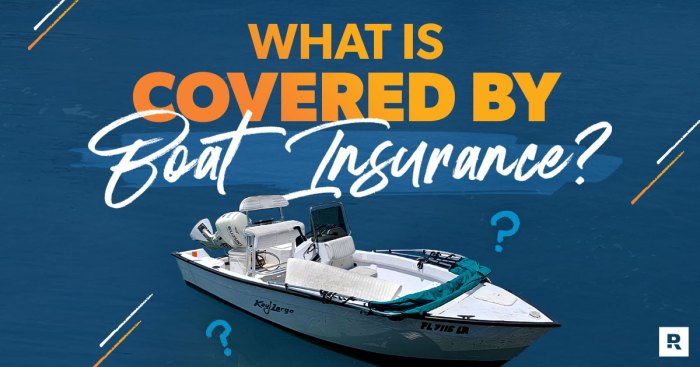What is the best insurance for people who own a boat? This is a question every boat owner grapples with, and the answer isn’t always straightforward. There are tons of different types of boat insurance out there, and each one offers a unique mix of coverage and benefits.
Choosing the right insurance can be a real headache, but it’s crucial to protect your investment and your peace of mind.
To help you navigate this confusing world, we’ll break down the key factors to consider, including the different types of boat insurance, the factors that affect your premium, and how to choose the right provider. We’ll also cover the essential terms and conditions of boat insurance policies, as well as the process of filing a claim.
Factors Influencing Boat Insurance Costs

Boat insurance costs can vary significantly depending on several factors. Understanding these factors can help you make informed decisions and find the best coverage for your specific needs.
Boat Size, Type, and Age
The size, type, and age of your boat play a significant role in determining your insurance premiums. Larger and more powerful boats generally cost more to insure due to their higher potential for damage and liability. Similarly, boats with high-performance engines or specialized features may also have higher premiums.
The age of your boat is another factor, as older boats are more prone to mechanical issues and may have lower resale value.
Intended Use
The way you intend to use your boat significantly impacts your insurance costs. Boats used for recreational purposes, such as fishing or cruising, typically have lower premiums compared to those used for commercial activities, such as charter services or water sports instruction.
This is because commercial use exposes the boat to higher risks, such as more frequent operation, heavier loads, and potential for accidents.
Geographical Location
Your boat’s geographical location is a critical factor in determining your insurance premiums. Coastal areas with high boat traffic and challenging weather conditions tend to have higher insurance costs compared to inland waterways. The risk of collisions, storms, and other hazards is greater in these areas, leading to higher insurance premiums.
Boating Experience
Your boating experience, or lack thereof, can also influence your insurance premiums. Insurers often offer discounts to experienced boaters with a proven track record of safe operation. On the other hand, novice boaters may face higher premiums due to their lack of experience and potential for accidents.
Safety Features and Risk Management Strategies, What is the best insurance for people who own a boat?
Installing safety features on your boat can potentially lower your insurance costs. Features such as a bilge pump, fire extinguisher, and life jackets demonstrate your commitment to safety and reduce the likelihood of accidents. Additionally, adopting risk management strategies, such as taking boating safety courses and avoiding risky behaviors, can also signal to insurers that you are a responsible boater, potentially leading to lower premiums.
Choosing the Right Boat Insurance Provider

Finding the right boat insurance provider can be a daunting task, but it’s essential to ensure you have the right coverage and support in case of an accident or mishap. With so many insurance companies offering boat insurance, it can be overwhelming to compare their offerings and choose the best option for your needs.
Comparing Boat Insurance Providers
When choosing a boat insurance provider, it’s crucial to compare and contrast their offerings across several key factors. This includes evaluating their coverage options, pricing, customer service, and claims processing.
Coverage Options
- Hull Coverage: This protects your boat against damage from accidents, storms, fire, theft, and other perils. Consider the level of coverage you need, such as actual cash value (ACV) or replacement cost value (RCV). ACV covers the current market value of your boat, while RCV covers the cost of replacing it with a new one.
- Liability Coverage: This protects you from financial liability if you cause damage to another person’s property or injure someone while operating your boat. The amount of liability coverage you need will depend on the size and type of your boat and your risk tolerance.
- Medical Payments Coverage: This pays for medical expenses for you and your passengers if you are injured in a boating accident. This coverage is usually included in a standard boat insurance policy.
- Uninsured Boater Coverage: This protects you if you are involved in an accident with another boater who does not have insurance. This coverage is important if you operate your boat in areas with a high density of boat traffic.
- Towing and Assistance: This coverage pays for towing and other assistance if your boat breaks down or becomes disabled. It’s essential to have this coverage if you operate your boat in remote or offshore areas.
Pricing
- Boat Value: The value of your boat is a significant factor in determining your insurance premium. Higher-value boats generally have higher premiums.
- Boat Type: Different types of boats have different risk profiles, which can affect your insurance premium. For example, sailboats are generally considered less risky than powerboats.
- Boat Age: Older boats are more likely to experience mechanical problems or require repairs, which can increase your insurance premium.
- Your Location: The location where you operate your boat can affect your insurance premium. For example, boats operated in areas with high boat traffic or harsh weather conditions may have higher premiums.
- Your Boating Experience: Your experience as a boater can also influence your insurance premium. More experienced boaters may have lower premiums than those with less experience.
Customer Service
- Responsiveness: When you need to contact your insurance provider, you want to be sure they are responsive and helpful. Look for companies with a reputation for providing excellent customer service.
- Availability: Ensure your insurance provider is available when you need them, whether it’s during business hours or after hours. Look for companies with multiple ways to contact them, such as phone, email, and online chat.
Claims Processing
- Speed: If you need to file a claim, you want to be sure your insurance provider processes it quickly and efficiently. Look for companies with a reputation for handling claims promptly and fairly.
- Transparency: Ensure your insurance provider is transparent about their claims process and provides clear communication throughout the process.
Tips for Researching and Selecting a Boat Insurance Provider
- Get Quotes from Multiple Providers: Don’t settle for the first quote you receive. Get quotes from several different insurance providers to compare their offerings and pricing.
- Read Reviews and Testimonials: See what other boat owners have to say about different insurance providers. Online reviews and testimonials can provide valuable insights into a company’s customer service, claims processing, and overall satisfaction.
- Ask About Discounts: Many insurance providers offer discounts for boaters with certain characteristics, such as those who have completed boating safety courses, have a clean driving record, or have a good credit score. Be sure to ask about any discounts that may be available to you.
- Consider Your Needs and Budget: Think about the type of coverage you need, your budget, and your risk tolerance. Choose an insurance provider that meets your specific needs and provides the best value for your money.
Reputable Boat Insurance Providers
Here are a few examples of reputable boat insurance providers:
- BoatUS: BoatUS is a non-profit organization that offers a wide range of insurance products, including boat insurance, towing and assistance, and liability coverage. They are known for their excellent customer service and competitive pricing.
- Progressive: Progressive is one of the largest insurance companies in the United States, offering boat insurance with a variety of coverage options and discounts. They are known for their online tools and resources, making it easy to get quotes and manage your policy.
- Nationwide: Nationwide is another major insurance company that offers boat insurance with comprehensive coverage and competitive pricing. They are known for their strong financial stability and commitment to customer satisfaction.
Understanding Boat Insurance Policy Terms

Boat insurance policies are filled with terms and conditions that can be confusing. Understanding these terms is crucial for ensuring you have adequate coverage and making informed decisions about your policy.
Understanding Key Terms
Understanding the key terms in your boat insurance policy is crucial for making informed decisions. These terms define the scope of your coverage, your responsibilities, and the financial implications of claims.
- Deductible:This is the amount you pay out of pocket for each claim before your insurance coverage kicks in. A higher deductible typically means lower premiums, while a lower deductible results in higher premiums.
- Coverage Limits:These are the maximum amounts your insurance company will pay for specific types of losses, such as damage to your boat, liability for injuries to others, or medical expenses.
- Exclusions:These are specific events or situations that are not covered by your policy. Common exclusions include damage caused by wear and tear, intentional acts, or certain types of racing events.
The Importance of Policy Terms
Your boat insurance policy is a contract that Artikels the terms of coverage between you and your insurance company. Understanding the specific terms and conditions of your policy is crucial for several reasons:
- Ensuring Adequate Coverage:Knowing what your policy covers and doesn’t cover helps you determine if it meets your specific needs. If you engage in activities that are not covered by your policy, you may need to purchase additional coverage.
- Avoiding Unnecessary Costs:Understanding your deductible and coverage limits allows you to make informed decisions about whether to file a claim. If the cost of repairs is less than your deductible, it may be more cost-effective to pay for the repairs yourself.
- Protecting Yourself from Financial Risk:Exclusions can significantly impact your coverage. For example, if your policy excludes coverage for certain types of racing events, you could be financially responsible for any damages or injuries that occur during those events.
Reviewing and Negotiating Policy Terms
It’s important to review your boat insurance policy carefully before signing it. Pay attention to the following:
- Deductible:Consider your financial situation and the potential cost of repairs when choosing a deductible. A higher deductible can save you money on premiums but could leave you with a large out-of-pocket expense if you need to file a claim.
- Coverage Limits:Make sure the coverage limits are sufficient to cover the value of your boat and any potential liabilities.
- Exclusions:Understand the limitations of your coverage. If you engage in activities that are excluded, you may need to purchase additional coverage or consider a different policy.
Don’t hesitate to ask your insurance agent to explain any terms you don’t understand. You can also negotiate the terms of your policy, especially if you have a good driving record or have multiple policies with the same insurance company.
Navigating Boat Insurance Claims
Filing a boat insurance claim can be a stressful experience, but understanding the process can help you navigate it smoothly. This section will guide you through the steps involved, from reporting the incident to receiving compensation, ensuring a fair and efficient resolution.
Reporting the Incident
The first step in filing a boat insurance claim is reporting the incident to your insurance company. This should be done as soon as possible after the incident occurs. Most insurance companies have a 24/7 claims hotline that you can call to report the incident.
You will need to provide the insurance company with details about the incident, including:
- The date, time, and location of the incident
- A description of what happened
- The names and contact information of any witnesses
- The extent of the damage to your boat and any other property involved
It’s essential to be as detailed as possible when reporting the incident. This will help the insurance company to assess your claim quickly and efficiently.
Documenting the Incident
Documenting the incident thoroughly is crucial for supporting your claim. Take photographs and videos of the damage to your boat and any other property involved. Collect witness statements, including contact information. These documents will provide evidence to support your claim and help you receive the compensation you deserve.
Working with the Insurance Company
After you have reported the incident and provided all necessary documentation, the insurance company will begin to process your claim. You will likely need to meet with an insurance adjuster to discuss the incident and the extent of the damage.
Be prepared to answer questions about the incident and provide any additional information requested.
Resolving the Claim
Once the insurance company has assessed your claim, they will make a decision about the amount of compensation you will receive. If you agree with the settlement offer, you will receive your compensation. However, if you disagree with the offer, you have the right to appeal the decision.
It is essential to be prepared to negotiate with the insurance company to ensure you receive a fair settlement.
Tips for Navigating Boat Insurance Claims
- Keep your insurance policy handy and review it thoroughly.
- Report the incident promptly and provide accurate details.
- Document the incident thoroughly with photographs, videos, and witness statements.
- Be cooperative with the insurance company and provide all requested information.
- Be prepared to negotiate the settlement offer.
- Consider consulting with a legal professional if you have questions or concerns about the claim process.
Final Summary

Choosing the right boat insurance can seem like a daunting task, but with a little research and planning, you can find the coverage that best fits your needs and budget. By understanding the different types of insurance available, the factors that influence premiums, and the essential terms of your policy, you can make informed decisions and ensure that you’re properly protected on the water.
So, grab your life vest, put on your captain’s hat, and let’s dive into the world of boat insurance!
FAQs: What Is The Best Insurance For People Who Own A Boat?
What are some common exclusions in boat insurance policies?
Boat insurance policies often exclude coverage for certain events, such as damage caused by wear and tear, intentional acts, or racing. It’s important to review your policy carefully to understand what is and isn’t covered.
How can I reduce my boat insurance premiums?
There are several ways to reduce your premiums, including maintaining a good driving record, installing safety features, and taking a boating safety course.
What is the difference between hull insurance and liability insurance?
Hull insurance covers damage to your boat, while liability insurance protects you against claims from others if you cause an accident.
How long does it take to process a boat insurance claim?
The processing time for a boat insurance claim can vary depending on the complexity of the claim and the insurance company. It’s important to be patient and communicate with your insurance company regularly.
Can I cancel my boat insurance policy early?
You may be able to cancel your policy early, but you may have to pay a cancellation fee. It’s important to review your policy terms and conditions to understand the cancellation process.
